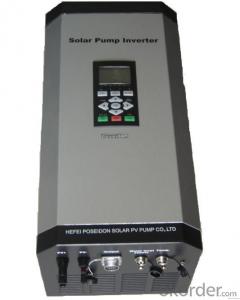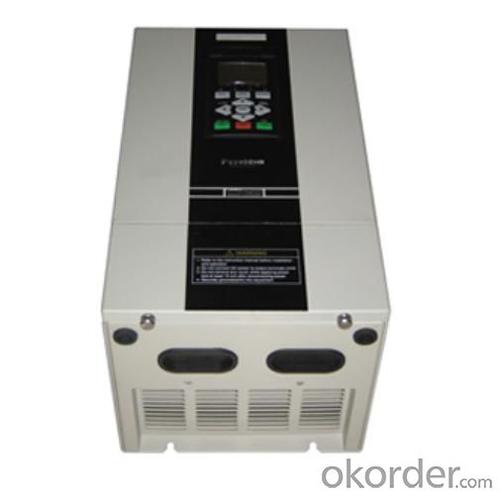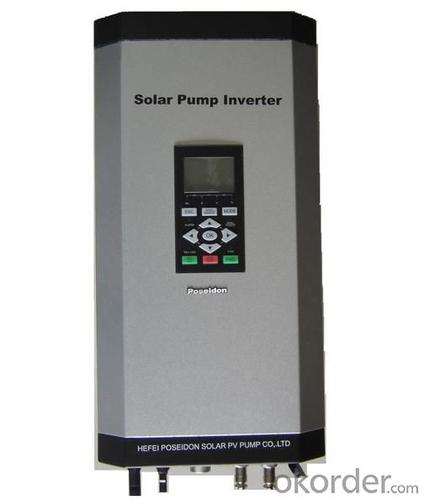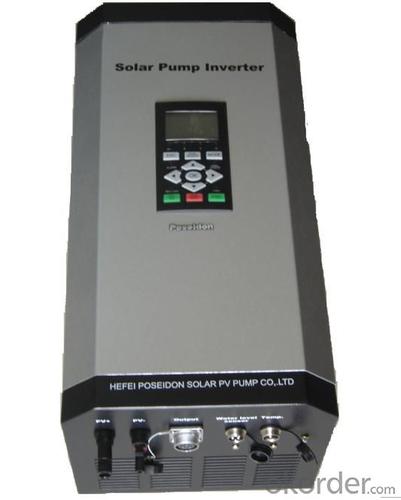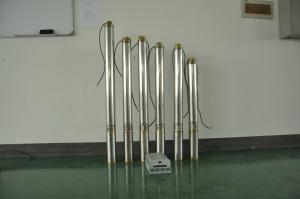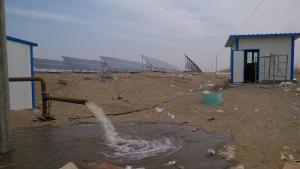Solar Pump for Rain Barrel FCPM30KH Inverter
- Loading Port:
- China Main Port
- Payment Terms:
- TT OR LC
- Min Order Qty:
- -
- Supply Capability:
- -
OKorder Service Pledge
Quality Product, Order Online Tracking, Timely Delivery
OKorder Financial Service
Credit Rating, Credit Services, Credit Purchasing
You Might Also Like
Solar pump inverter FCPM30KH Product Description:
Solar water pumping system is constructed with solar panel array,solar pump inverter and AC water pump, DC current produced from solar panel will be delivered to solar pump inverter,and it will convert it into AC current to drive water pump,and will automatically regulate output frequency according to sun radiance intensity,maximally realize MPPT tracking function.
Features
Adopting the proposed dynamic VI maximum power point tracking (MPPT) control method, with fast response, and reliable operation, achieves efficiency of 99%.
Designed with variable frequency driver, greatly improves efficiency
Extremely high efficiency
Digital mode control, with automatic operation and manual operation mode options
Complete protection functions
Adopts intelligent IPM module, with high reliability
LCD display and operation panel, in real time presents operating data
Optional for water level measurement and control circuit
Applicable for general ACC pumps, like centrifugal pump, piston pump etc.
Independent intellectual property; Highly effective, the redundant reliability, exempts the maintenance and the long life.
The pumps are soft started, fully protected.
No batteries are used. So better Sunlight, more water.
Datasheet.
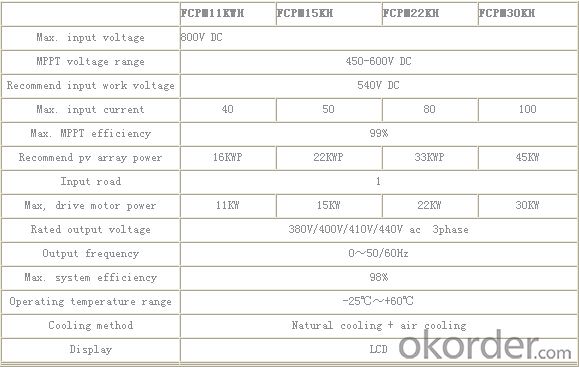
- Q: Can a solar pump be used for water supply in off-grid dairy farms?
- Yes, a solar pump can be used for water supply in off-grid dairy farms. Solar pumps are an excellent option for off-grid applications as they operate using solar energy, eliminating the need for grid electricity. These pumps use photovoltaic (PV) panels to convert sunlight into electricity, which powers the pump to move water from a source to the desired location. For dairy farms located in remote areas without access to the grid, solar pumps offer a reliable and sustainable solution for water supply. They can be used to draw water from wells, boreholes, or other water sources and distribute it to various areas of the farm, such as livestock watering troughs, cleaning systems, or irrigation systems. Solar pumps have several advantages for off-grid dairy farms. Firstly, they are cost-effective in the long run as they don't require any electricity bills or fuel costs. Additionally, they have minimal maintenance requirements, reducing operational costs. Furthermore, solar pumps are environmentally friendly, as they produce clean energy and do not contribute to greenhouse gas emissions. It's important to note that the size and capacity of the solar pump should be chosen according to the specific water requirements of the dairy farm. Factors such as the number of livestock, daily water consumption, and distance to the water source should be considered when selecting an appropriate solar pump system. Overall, solar pumps are a viable and efficient option for water supply in off-grid dairy farms, providing a reliable and sustainable solution for meeting the water needs of the farm while reducing costs and environmental impact.
- Q: Can a solar pump be used in areas with limited access to water storage?
- Yes, a solar pump can be used in areas with limited access to water storage. Solar pumps are designed to operate independently of a grid or electricity supply, utilizing solar energy to pump water from a source such as a well or a water body. They can be used in remote areas where access to water storage may be limited, providing a reliable and sustainable solution for water supply.
- Q: Do solar pumps require maintenance?
- Yes, solar pumps require regular maintenance to ensure optimal performance and longevity. This includes cleaning the solar panels to remove dust and debris, inspecting the pump system for any leaks or damage, and checking the battery and electrical connections. Additionally, routine maintenance may also involve lubricating moving parts and replacing worn-out components. Proper and timely maintenance is essential for the efficient operation of solar pumps.
- Q: How does the cost of a solar pump compare to a diesel or electric pump?
- The cost of a solar pump compared to a diesel or electric pump can vary depending on several factors. In terms of upfront costs, a solar pump generally has a higher initial investment compared to a diesel or electric pump. This is because a solar pump requires the installation of solar panels, inverters, and batteries to harness and store solar energy. These additional components can increase the overall cost of the system. However, when considering the long-term operational costs, a solar pump is significantly more cost-effective. Solar energy is free and abundant, which means there are no fuel costs associated with running a solar pump. On the other hand, diesel pumps require regular fuel refills, and electric pumps are connected to the grid, which means ongoing electricity bills. Moreover, solar pumps have lower maintenance costs compared to diesel or electric pumps. Diesel pumps require frequent maintenance to ensure proper functioning, such as oil changes, filter replacements, and regular engine maintenance. Electric pumps may also require maintenance and repairs due to electrical faults or grid outages. In contrast, solar pumps have relatively fewer moving parts, making them more reliable and requiring less maintenance. Additionally, solar pumps are environmentally friendly as they produce zero greenhouse gas emissions during operation, whereas diesel pumps contribute to air pollution and carbon emissions. Electric pumps, although cleaner, still rely on electricity generated from various sources, some of which may involve carbon-intensive methods. It is important to note that the cost comparison between these types of pumps may vary depending on factors such as the size of the system, location, local energy prices, and the availability of sunlight. In some cases, government incentives or subsidies for renewable energy technologies may also affect the cost comparison. Overall, while the upfront cost of a solar pump may be higher, its lower operational and maintenance costs, as well as its environmental benefits, make it a more cost-effective and sustainable choice in the long run compared to diesel or electric pumps.
- Q: How does a solar pump handle water with high levels of iron or manganese?
- A solar pump can handle water with high levels of iron or manganese by utilizing various filtration techniques. These pumps are often equipped with pre-filters or sediment filters that help to remove the iron or manganese particles from the water before it enters the pump. Additionally, certain solar pumps may employ specialized oxidation or chemical treatment methods to effectively reduce the levels of these minerals in the water. By incorporating these filtration and treatment mechanisms, solar pumps can efficiently handle water with high iron or manganese content, ensuring the water quality is suitable for various applications.
- Q: Can a solar pump be used for water supply in schools and hospitals?
- Yes, a solar pump can be used for water supply in schools and hospitals. Solar pumps are an efficient and sustainable solution that can provide a reliable water source for these institutions. They can operate in remote areas without access to electricity, reducing reliance on fossil fuels and minimizing operating costs. Solar pumps are also environmentally friendly, making them an ideal choice for schools and hospitals aiming to reduce their carbon footprint.
- Q: Are solar pumps cost-effective compared to traditional pumps?
- Yes, solar pumps are cost-effective compared to traditional pumps. While the initial upfront cost of installing a solar pump may be higher, they have significantly lower operational costs as they rely on free and renewable solar energy to power them. Traditional pumps, on the other hand, require electricity or fuel, which can be expensive and subject to price fluctuations. Additionally, solar pumps have lower maintenance costs and longer lifespans, resulting in overall cost savings in the long run.
- Q: Do solar pumps require regular maintenance?
- Yes, solar pumps do require regular maintenance. This includes cleaning the solar panels to ensure maximum sunlight absorption, checking and replacing any worn-out parts, inspecting the pump's performance, and ensuring proper functioning of the system. Regular maintenance helps to prolong the lifespan of the solar pump and ensures optimal efficiency.
- Q: Are there any special considerations for installing a solar pump in a coastal area?
- Installing a solar pump in a coastal area comes with several special considerations. First and foremost, the corrosive nature of saltwater is a major concern. Coastal areas have higher salt content in the air and soil, which can speed up the corrosion of metal components and electrical connections. Therefore, it is vital to select corrosion-resistant materials like stainless steel or marine-grade materials to ensure the durability of the solar pump system. Another factor to take into account is the possibility of extreme weather conditions in coastal areas. These regions are often susceptible to strong winds, storms, and even hurricanes. It is crucial to design and install the solar pump system in a manner that can withstand these weather events. This may involve properly securing the solar panels and equipment, as well as carefully choosing the installation location to minimize exposure to strong winds. Furthermore, being in close proximity to saltwater bodies can affect the water source for the pump. Saltwater or brackish water may require additional pre-treatment or filtration before it can be utilized with the pump system. This could entail the installation of a desalination system or the use of specialized filters to eliminate impurities and ensure the water quality is suitable for the pump. Lastly, the coastal environment may have specific regulations and permits that must be taken into consideration during the installation of a solar pump. It is crucial to conduct thorough research and comply with any local regulations pertaining to the installation of renewable energy systems in coastal areas. In conclusion, installing a solar pump in a coastal area necessitates careful consideration of corrosion resistance, weather resilience, water source quality, and compliance with local regulations. By addressing these unique considerations, the solar pump system can operate efficiently and effectively in the coastal environment.
- Q: Can a solar pump be used in areas with limited access to water treatment facilities?
- Yes, a solar pump can be used in areas with limited access to water treatment facilities. Solar pumps are designed to draw water from various sources such as wells, rivers, or lakes, and can be installed in remote locations where traditional water treatment facilities are not available. These pumps can provide a reliable and sustainable solution for accessing clean water in areas with limited infrastructure.
Send your message to us
Solar Pump for Rain Barrel FCPM30KH Inverter
- Loading Port:
- China Main Port
- Payment Terms:
- TT OR LC
- Min Order Qty:
- -
- Supply Capability:
- -
OKorder Service Pledge
Quality Product, Order Online Tracking, Timely Delivery
OKorder Financial Service
Credit Rating, Credit Services, Credit Purchasing
Similar products
Hot products
Hot Searches
Related keywords


